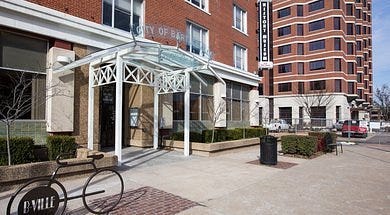Anonymity as a Threat, Surveillance As the Illegal Solution
Bartlesville Officials Justify Illegal Surveillance by Reframing Privacy as Danger
In 2024, the Bartlesville City Council (Bartlesville, Oklahoma) approved a contract with Flock Safety to install automated license plate reader (ALPR) cameras throughout the city. The move came without a public vote, and community notification occurred only after the decision was finalized. According to the City of Bartlesville’s official FAQ on the Flock Safety Camera System, the purpose of the program is to “provide actionable, objective evidence to law enforcement agencies to prevent and eliminate crime” (City of Bartlesville FAQ). This was further reinforced by Police Chief Kevin Ickleberry during a January 2025 public forum, where he stated that Flock cameras had already been instrumental in solving crimes, locating missing children, and apprehending suspects involved in serious offenses (Bartlesville Police Forum).
These public safety justifications, however, appear to conflict with state law. Oklahoma Statute 47 O.S. § 7-606.1 permits ALPR technology to be used solely for verifying compliance with mandatory vehicle insurance (Justia). Bartlesville’s stated and operational use of the Flock system for general crime enforcement exceeds that legal boundary. Tulsa has similarly installed over 100 Flock cameras for broader public safety goals, raising additional legal and ethical questions.
Flock Safety, headquartered in Atlanta, markets its systems as crime-fighting tools. Each Flock camera captures license plate numbers, timestamps, vehicle make, model, and color, as well as visual identifiers like bumper stickers or damage. This data is stored for 30 days and can be accessed by law enforcement through the TALON (Total Analytics Law Enforcement Network) platform, which allows agencies to share information across jurisdictions without a warrant (Flock Safety Overview).
While Flock claims its cameras do not violate the Fourth Amendment, that defense unravels when ALPR data is cross-referenced with digital identifiers. In its public defense, the company has argued that there is “no expectation of privacy” on public roads—a position that mirrors longstanding law enforcement interpretations. However, in practice, ALPR logs can be combined with IP addresses, geofencing data, or app-based location tracking to identify and monitor individuals without a warrant. This form of digital triangulation has already been deemed constitutionally problematic by federal courts. In 2024, a judge in Norfolk, Virginia ruled that a lawsuit challenging the city’s use of Flock cameras could proceed. The case, filed by the Institute for Justice, argues that persistent warrantless surveillance of ordinary people violates both the U.S. and Virginia constitutions (IJ Press Release).
Flock’s claims of crime-solving success also face growing scrutiny. Despite advertising that its systems assist in solving up to 10% of reported crimes nationwide, there is limited independent verification of those figures. A 2024 Wired investigation into San Marino, California found that, despite Flock’s claim of an 80% reduction in residential burglaries, police data showed that serious crime rates had stayed flat or even increased. “According to crime statistics from the San Marino Police Department, the number of serious crimes remained relatively unchanged, contradicting the reduction claimed by Flock” (Wired Crime).
In a separate case, Flock’s AI-based gunshot detection system was deployed in San Jose, California, where it generated false alerts in 50% of its reports. This raised concerns not only about accuracy but about the overreliance on automated enforcement tools in situations that require human context and verification (Wired Gunshot).
Concerns about the potential for misuse are not hypothetical. In Sedgwick, Kansas, a police chief used the Flock system to stalk a former partner—an incident that led to disciplinary action and highlighted the lack of built-in safeguards to prevent abuse (Kansas.com).
The American Civil Liberties Union (ACLU) has warned that license plate readers like those deployed by Flock normalize mass surveillance infrastructure and are easily repurposed to target protestors, mutual aid groups, or politically unpopular communities. According to the ACLU, the technology “poses serious threats to privacy and civil liberties” and operates with “minimal oversight and little to no transparency” (ACLU).
The installation of these systems in Bartlesville occurred during a time of heightened tension around surveillance and civil liberties in northeastern Oklahoma. When paired with geospatial and networked data—including IP address logs, cell phone pings, and social media metadata—ALPR systems can be used to track residents engaged in constitutionally protected activities. This includes protestors, labor organizers, and journalists.
In other cities, such as Oakland, California, similar concerns have prompted public pushback. Despite lobbying efforts from homeowner associations and private funders, Oakland officials have delayed further Flock expansion until oversight mechanisms and transparency standards can be developed (Oaklandside).
Bartlesville’s deployment of Flock cameras was approved internally, justified after the fact, and implemented in contradiction of state law. At the time of publication, the system remains unregulated at the state level, untested in Oklahoma courts, and in use despite sustained public concern and a growing body of evidence questioning its effectiveness and legality.
Sources
Oklahoma Statutes Title 47, § 7-606.1 – Use of ALPR for Insurance Enforcement Only
https://law.justia.com/codes/oklahoma/title-47/section-47-7-606-1/City of Bartlesville – Flock Safety Camera System FAQ
https://www.cityofbartlesville.org/flock-safety-camera-system-faq/City of Bartlesville – Police Department Hosts Flock Safety Camera Forum (Jan 2025)
https://www.cityofbartlesville.org/police-department-hosts-flock-safety-camera-forum-2/Bartlesville Radio – “Some Residents Voice Concerns Over Flock Cameras” (April 2025)
https://bartlesvilleradio.com/pages/news/440482024/some-bartlesville-residents-voice-concerns-over-flock-camerasFlock Safety – License Plate Reader Camera System Overview
https://www.flocksafety.com/resources/license-plate-reader-cameras-overviewInstitute for Justice – “Judge Rules Lawsuit Challenging Norfolk’s Use of Flock Cameras Can Proceed” (2024)
https://ij.org/press-release/judge-rules-lawsuit-challenging-norfolks-use-of-flock-cameras-can-proceed/Wired – “The Murky Math Behind Flock Safety’s Crime-Fighting Claims” (2024)
https://www.wired.com/story/flock-safety-license-plate-readers-crimeWired – “Gunshot Detection AI Has a False Alarm Problem” (April 2024)
https://www.wired.com/story/ai-gunshot-detection-accuracy-san-jose-nycThe Wichita Eagle – “Sedgwick Police Chief Misused Flock Cameras to Track Ex” (2024)
https://www.kansas.com/news/local/crime/article285160537.htmlACLU – “How to Pump the Brakes on Your Police Department’s Use of Flock’s Mass Surveillance License Plate Readers”
https://www.aclu.org/news/privacy-technology/how-to-pump-the-brakes-on-your-police-departments-use-of-flocks-mass-surveillance-license-plate-readersThe Oaklandside – “Oakland Homeowner Groups Are Building a Powerful Surveillance Network” (2024)
https://oaklandside.org/2024/03/27/oakland-homeowner-groups-powerful-surveillance-cameras/






